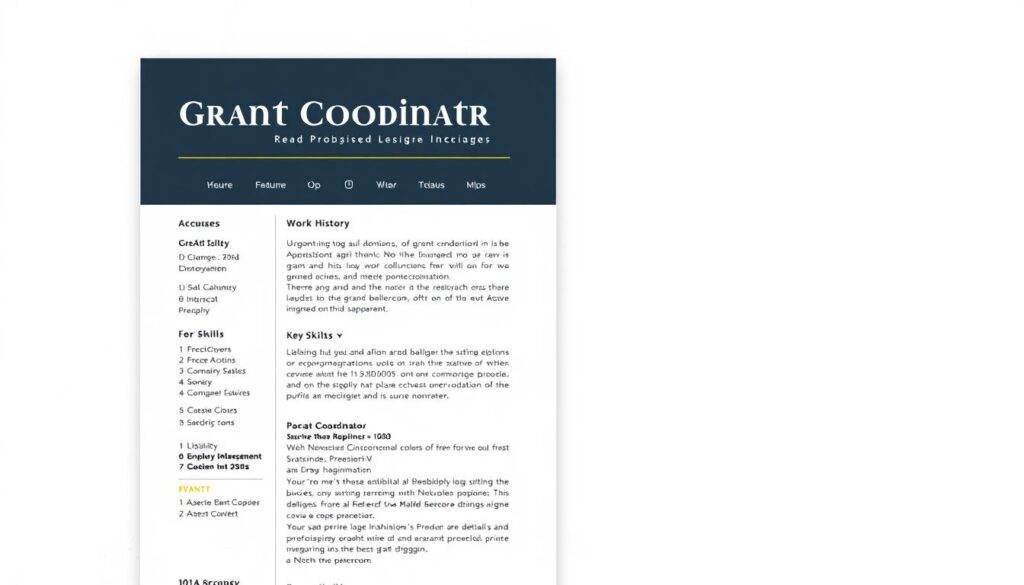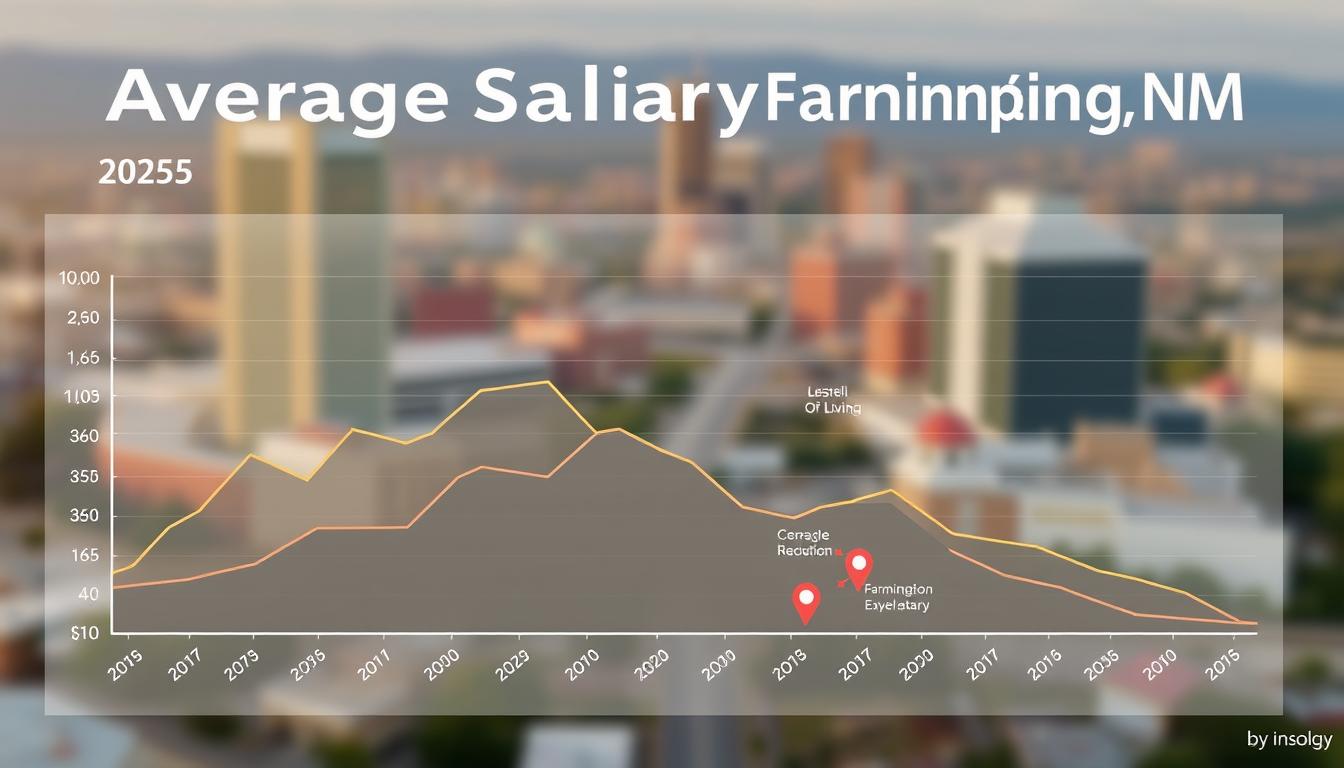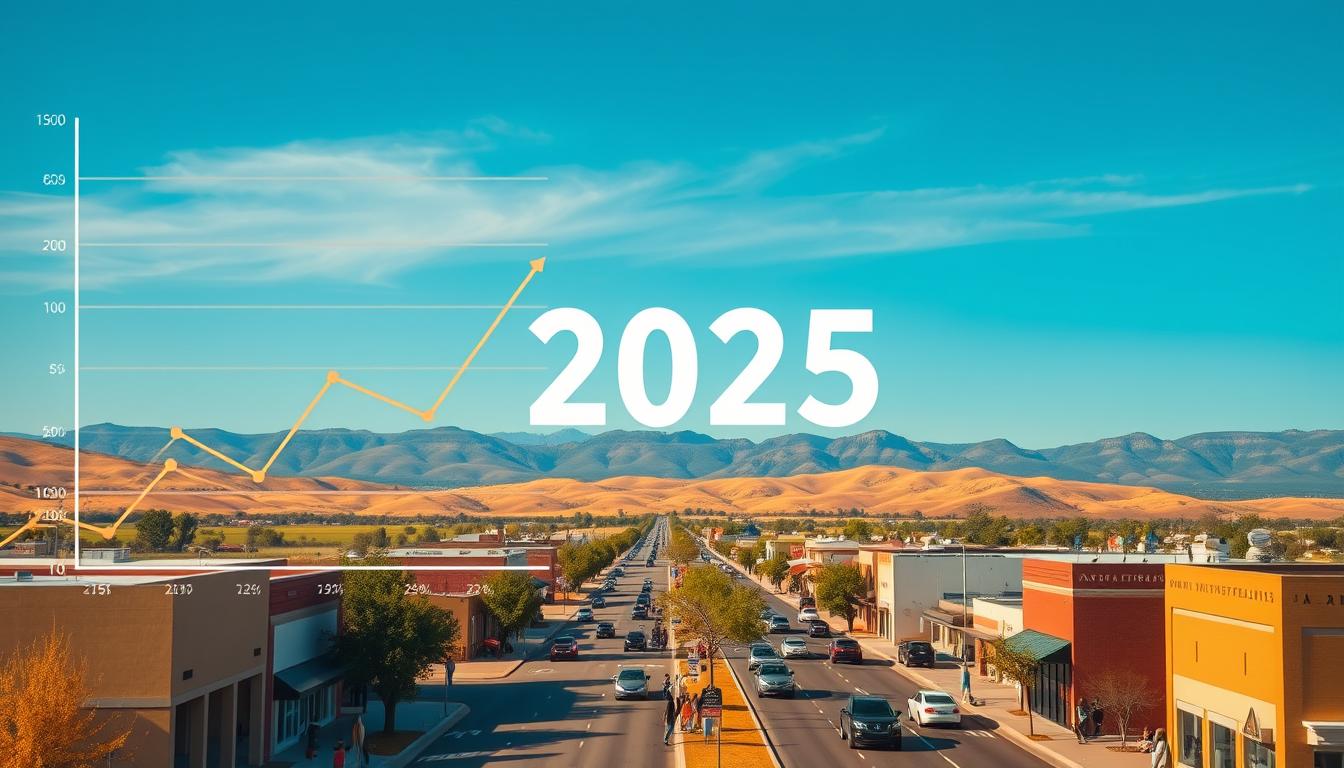Did you know senior grant coordinators in San Francisco earn up to $71.19/hour? That’s over $148,000 annually for professionals who master proposal writing, compliance, and stakeholder management. With organizations like The Pittsburgh Foundation offering $52,365+ for entry-level roles, this field combines financial stability with meaningful community impact.
The 2025 job market demands more than basic qualifications. Employers now prioritize candidates who demonstrate expertise in digital grant management systems, data-driven reporting, and cross-department collaboration. You’ll need a resume that highlights these specific competencies, not just generic administrative skills.
This guide cuts through the noise. You’ll learn to showcase your ability to secure funding while aligning proposals with organizational goals. Tools like RoboApply’s event coordinator resume examples adapt seamlessly to grant roles, helping you structure measurable achievements and keyword-optimized content.
We’ll also unpack salary negotiation tactics for government and nonprofit sectors. Whether you’re targeting a $42,000 starter position or a six-figure leadership role, you’ll gain strategies to position yourself as the solution to funding challenges.
Key Takeaways
- Entry-level grant coordinators earn $40,000-$50,000, with senior roles exceeding $90,000 annually
- Technical skills in CRM platforms and data analytics now outweigh generic administrative abilities
- RoboApply’s AI tools reduce application time by 70% through automated resume tailoring
- Real-world examples show how to quantify grant management successes for interviews
- Geographic targeting impacts earnings, with coastal cities offering 35% higher pay
Understanding the Role of a Grant Coordinator
Grant coordinators drive funding success through precision and organization. Your work ensures nonprofits and institutions secure resources to meet community needs. Let’s break down what this position truly involves.
Key Responsibilities
You’ll oversee the entire grant lifecycle, starting with identifying opportunities that align with organizational goals. This means verifying funder requirements, coordinating proposal submissions, and managing post-award documentation. Compliance isn’t optional – you’ll double-check every budget line and reporting deadline against funder guidelines.
Collaboration sits at the core of this role. Program teams rely on your ability to translate project ideas into fundable proposals. When current grant coordinator openings list “cross-functional teamwork,” they mean you’ll gather data from finance, validate metrics with operations, and ensure unified messaging.
Daily Tasks Overview
Mornings often begin with deadline tracking systems. You might update a shared calendar for 12 active grants while flagging upcoming reports. Afternoons could involve drafting progress updates or organizing audit-ready files. Financial tracking happens weekly – reconciling expenses against allocated budgets requires sharp attention to detail.
Your administrative expertise shines when managing multiple funder portals. One minute you’re uploading supporting documents for a federal grant, the next you’re formatting attachments for a corporate foundation. Tools like those in project coordinator resume strategies adapt well here, helping streamline repetitive tasks.
Communication loops close each day. You might email a funder about payment timelines, then brief your manager on compliance updates. Every interaction builds trust – both internally and with external partners.
Crafting a Winning Resume for Grant Coordinator Roles
Your resume is your first opportunity to demonstrate grant management expertise in a competitive job market. With 72% of hiring managers using applicant tracking systems (ATS), strategic formatting and keyword placement determine whether your application gets seen.

RoboApply's AI Resume Builder Advantage
RoboApply’s AI-powered tools transform generic resumes into targeted applications. The platform analyzes job descriptions to prioritize skills like budget reconciliation and compliance tracking. You’ll input your experience once, then generate multiple versions optimized for specific roles.
One user increased interview requests by 40% after highlighting “Managed 23 state/federal grants with 100% compliance.” This specificity matters more than listing duties. The system suggests measurable achievements based on your input, ensuring you showcase organizational skills effectively.
Mastering ATS Optimization
RoboApply’s ATS optimizer scans for critical phrases like “grant lifecycle management” or “stakeholder collaboration.” It ensures your resume matches the software’s parsing algorithms while maintaining natural language flow. You’ll receive real-time feedback on keyword density and section hierarchy.
Place technical proficiencies upfront – list exact systems like Fluxx Grants Manager or Blackbaud Award Management. Hiring teams look for this detail to assess training needs. For communication skills, prove them through examples: “Presented quarterly reports to 15+ funders with 92% satisfaction ratings.”
Always include a dedicated Professional Summary section. Structure it like this: “Certified grant coordinator with 4 years’ experience securing $1.8M+ in funding. Expert in NIH guidelines and cross-departmental workflow coordination.” This creates immediate relevance before readers reach your employment history.
Showcasing Essential Skills for Grant Coordination
Successful professionals blend technical expertise with human-centered abilities. Modern employers demand candidates who can navigate complex software and build trust across teams. Let’s explore the exact capabilities that turn applicants into top contenders.
Technical Skills
Master platforms like Salesforce Grants Management to track submissions and compliance. You’ll create detailed budgets that align expenses with funder restrictions – one error could jeopardize future funding. Build research routines using tools like Candid’s Foundation Directory to identify high-potential opportunities.
Develop razor-sharp writing skills for dual purposes: crafting persuasive proposals and producing transparent progress reports. Use data analysis to showcase impact – convert raw numbers into narratives like “23% increase in community outreach through funded program expansion.”
Interpersonal Qualities
Coordinate deadlines across departments without micromanaging. When program teams miss document requests, resolve conflicts by framing needs as shared goals: “Getting these metrics by Thursday helps us secure next year’s STEM funding.”
Implement time management systems like the Eisenhower Matrix to prioritize urgent compliance reports over long-term proposal drafts. During audits, demonstrate organizational skills by producing complete grant histories within 24 hours – this builds institutional credibility.
Anticipate roadblocks before they escalate. If a funder changes reporting requirements, immediately adjust workflows and retrain staff. Your problem-solving turns chaos into controlled action.
How to Land a Grant Coordinator Job in 2025

Focus your search on high-growth sectors like healthcare nonprofits and community development agencies. These organizations account for 68% of new grant coordinator roles, according to recent job market analysis. Educational institutions and environmental groups also offer strong prospects, particularly for candidates with niche expertise in STEM or sustainability funding.
Combine mainstream platforms like LinkedIn with specialized hubs such as Idealist and Chronicle of Philanthropy job boards. Set alerts for “funding opportunities coordinator” and similar variations to catch emerging roles. Pro tip: Many government agencies post openings exclusively on their websites during budget cycles each October and April.
Build strategic connections through the Grant Professionals Association’s virtual mixers and regional chapters. Attend webinars hosted by foundation leaders – these often include unadvertised job leads. When networking, highlight specific skills like federal grant compliance or corporate partnership development to stand out.
Tailor applications to each organization’s priorities. For university roles, emphasize experience with research grants and institutional review boards. When applying to nonprofit program teams, showcase donor stewardship and outcome measurement skills. Always reference the employer’s recent awards in your cover letter – this demonstrates proactive research.
Prepare concrete examples of past successes during interviews. Quantify achievements like “Secured $450K in STEM education grants through targeted foundation outreach” or “Reduced reporting errors by 83% using Fluxx workflow automation.” These specifics prove your ability to deliver measurable results.
Leveraging RoboApply Features for Job Applications
Managing multiple grant applications requires military-grade organization. RoboApply’s tools transform chaotic searches into structured campaigns, helping you maintain momentum without missing critical deadlines.
Auto-Apply Chrome Extension
Install RoboApply’s browser tool to accelerate submissions. The system scans job postings, auto-fills repetitive fields, and preserves custom cover letter elements. You maintain personalization while cutting application time by 65%.
Set filters for salary ranges and organization types. The extension only activates for roles matching your priorities. For federal positions, it highlights compliance keywords like “CFDA numbers” or “SAM.gov registration” in real-time.
Job Tracker Integration
Centralize all opportunities in one dashboard. Color-code applications by stage: submitted, interview scheduled, or pending follow-up. Track response rates across sectors to identify high-yield targets.
Use the analytics panel to spot patterns. If healthcare nonprofits respond 40% faster than educational institutions, adjust your strategy. Sync deadlines with Google Calendar to avoid last-minute scrambles.
Store notes on each organization’s funding priorities and recent awards. Before interviews, review these details to align your talking points. This approach works across roles, whether targeting clinical research roles or community development positions.
Preparing a Compelling Grant Coordinator Cover Letter

Your cover letter bridges your expertise with an organization’s funding needs. Start by researching their recent awards – mention specific initiatives like “supporting STEM outreach in underserved communities” to show alignment. This demonstrates you’ve studied their priorities beyond generic mission statements.
Quantify achievements using metrics that matter to funders. Instead of “wrote successful proposals,” state “secured $650K in federal grants with 97% compliance across 8 active awards.” Highlight software proficiencies like Workday Grants or SurveyMonkey Apply to address technical requirements upfront.
Highlight Your Achievements
Tailor opening paragraphs to mirror the employer’s language. If their job posting emphasizes collaborative workflows, reference “coordinating cross-departmental teams to meet 45-day submission deadlines.” Use RoboApply’s builder to maintain consistent branding while customizing these critical details.
Address pain points mentioned in the role description. For positions requiring audit preparation, showcase “reducing reporting errors by 79% through quarterly compliance checks.” Link these examples to the organization’s goals – “My process improvements could help streamline your EPA grant documentation.”
Close with actionable next steps. Write, “I’ll contact your team next Tuesday to discuss optimizing your funding pipeline.” Tools like those in crafting the perfect cover letter ensure professional formatting while preserving this strategic personalization.
Tailoring Your Grant Management Experience
Proven results separate qualified candidates from top performers. Employers need evidence you can navigate complex funding landscapes while maintaining strict compliance. Your application materials must transform abstract responsibilities into concrete value.

Success Stories That Resonate
Quantify achievements using funder-centric metrics. One professional secured $2.1M for rural healthcare by detailing: “Managed 14 concurrent grants with 98% compliance across USDA and HRSA programs.” This demonstrates capacity to handle volume without sacrificing quality.
Showcase problem-solving through specific challenges. Describe how you recovered a mismanaged $350K education grant: “Implemented weekly budget reviews, correcting $47K in misallocated funds within 45 days.” Such narratives prove your ability to course-correct under pressure.
Highlight cross-sector adaptability. If you’ve worked with NIH research grants and community development block grants, emphasize transferable skills: “Standardized reporting procedures reduced preparation time by 30% across 7 funding streams.”
Process improvements matter. Share measurable wins like “Cut proposal review cycles from 14 to 6 days using Asana tracking.” These details show you optimize workflows beyond basic task completion.
Developing Strategic Grant Writing Skills
Mastering grant writing transforms funding opportunities into secured resources. Start by analyzing each funder’s giving patterns through tools like Candid’s Foundation Directory. Match your organization’s objectives to their priorities – if a foundation funds youth STEM programs, highlight your robotics initiative’s enrollment growth.
Convert complex projects into clear narratives using data-driven impact statements. Instead of “improved community health,” write “reduced ER visits by 18% through mobile clinics serving 2,300 residents.” This specificity builds trust while demonstrating measurable outcomes.
Justify budgets with surgical precision. Link every expense to project goals: “$15,000 for certified trainers ensures curriculum fidelity.” Pair this with evaluation plans showing how you’ll track success – monthly surveys or third-party audits. Tools in grant writing mastery guides help structure these sections effectively.
Adapt your tone across proposals. Government grants demand technical language, while corporate funders prefer concise storytelling. Study winning examples in grant writer portfolios to balance persuasion with compliance. Practice restructuring content for 3 audiences: experts, community boards, and review committees.
FAQ
What technical skills do employers prioritize for grant coordinator roles?
Employers seek proficiency in grant management software like Fluxx or Submittable, along with expertise in budgeting, compliance reporting, and data analysis. Familiarity with funding priorities of agencies like NIH or NSF strengthens applications. Highlight certifications like GPC or CFRE if applicable.
How can I demonstrate grant lifecycle management on my resume?
Use bullet points to outline specific phases you’ve managed: proposal development, submission, compliance monitoring, and final reporting. Quantify outcomes, such as “Secured
FAQ
What technical skills do employers prioritize for grant coordinator roles?
Employers seek proficiency in grant management software like Fluxx or Submittable, along with expertise in budgeting, compliance reporting, and data analysis. Familiarity with funding priorities of agencies like NIH or NSF strengthens applications. Highlight certifications like GPC or CFRE if applicable.
How can I demonstrate grant lifecycle management on my resume?
Use bullet points to outline specific phases you’ve managed: proposal development, submission, compliance monitoring, and final reporting. Quantify outcomes, such as “Secured $1.2M in funding by managing 15+ grants annually.” Align these with funder priorities mentioned in job descriptions.
What tools help streamline grant applications in 2025?
Tools like RoboApply’s Auto-Apply Chrome Extension automate job searches, while platforms like SurveyMonkey Apply simplify submissions. Integrate project management software (e.g., Asana) to track deadlines and collaborate with stakeholders efficiently.
How important is compliance reporting for grant coordinators?
Critical. Funders audit adherence to guidelines like allowable costs or program outcomes. Showcase experience with compliance requirements by mentioning audits you’ve passed or systems you’ve implemented to reduce errors. This builds trust with hiring managers.
What makes a grant coordinator cover letter stand out?
Focus on measurable achievements rather than duties. Example: “Increased funding success rate by 30% through refined prospect research strategies.” Use keywords from the job posting, such as funding priorities or grant lifecycle, to align with applicant tracking systems.
How do I stay updated on emerging grant trends for 2025 roles?
Follow platforms like Grants.gov, Candid, or GrantStation. Join associations like GPA (Grant Professionals Association) for training on funding opportunities and policy changes. Mention these resources in interviews to show proactive learning.
Can I apply for grant coordinator jobs without direct experience?
Yes. Highlight transferable skills like project management, research, or technical writing. Use examples from volunteer work or academic projects where you identified funding opportunities or drafted proposals. Tailor these to match the employer’s funder priorities.
What tools help streamline grant applications in 2025?
Tools like RoboApply’s Auto-Apply Chrome Extension automate job searches, while platforms like SurveyMonkey Apply simplify submissions. Integrate project management software (e.g., Asana) to track deadlines and collaborate with stakeholders efficiently.
How important is compliance reporting for grant coordinators?
Critical. Funders audit adherence to guidelines like allowable costs or program outcomes. Showcase experience with compliance requirements by mentioning audits you’ve passed or systems you’ve implemented to reduce errors. This builds trust with hiring managers.
What makes a grant coordinator cover letter stand out?
Focus on measurable achievements rather than duties. Example: “Increased funding success rate by 30% through refined prospect research strategies.” Use keywords from the job posting, such as funding priorities or grant lifecycle, to align with applicant tracking systems.
How do I stay updated on emerging grant trends for 2025 roles?
Follow platforms like Grants.gov, Candid, or GrantStation. Join associations like GPA (Grant Professionals Association) for training on funding opportunities and policy changes. Mention these resources in interviews to show proactive learning.
Can I apply for grant coordinator jobs without direct experience?
Yes. Highlight transferable skills like project management, research, or technical writing. Use examples from volunteer work or academic projects where you identified funding opportunities or drafted proposals. Tailor these to match the employer’s funder priorities.


















